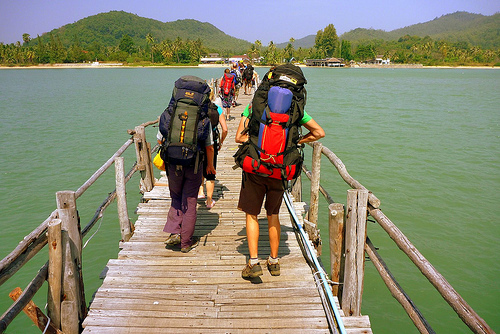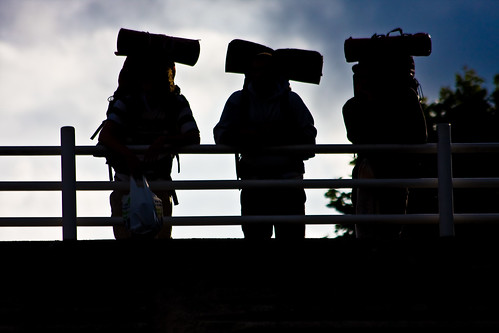Traveling Beyond Tourism


You are walking down the bustling town center with your overflowing Osprey 75 Liter strapped to your back like a turtle shell, last night’s laundry drying from every available strap. Tourist tassels at their finest. But hey, who can fault you for being efficient? No matter; right now, fashion is the obvious concern. Your day pack does the trick, goofy-footed to your chest so that your head floats in a mass of ErgoFIt, AirVenting, GoreTex-y goodness.
Congratulations, you’re now a pregnant turtle. With flair.
We’ve all been there. It’s part of the travel game. The awkward styles come with being a tourist, which contrary to popular belief, is not always a dirty word. Sometimes it’s best to take the tours, go on the cruises, pay the entrance fees, and check off numbers 1-6 on your adrenaline flavored bucket list. If you only have a short time in a place, it’s important to live it up as a blatant foreigner and get your money’s worth.
However there are times when we want to set the pregnant turtle down for a while. When fitting in, or rather joining in, is more conducive to our travel goals. As we do join in, we become more than a tourist, discovering a new depth – a richness – to our ideas of why we travel. The details of becoming a faux native can play out in a variety of ways. Here’s what I’ve found:
Treating others as better than yourself will naturally help you make local friends and will instantly increase your resident foreigner status. In New Zealand, our Kiwi friends call us “their Americans.” Endearing? Absolutely. But also mutually uplifting. We are now part of their lives and they, ours, for however long and then some. They’ve seen us on good days and bad. We have laughed together, cried together, partied together, served together, and shared together. The cost of such community is time, but the benefits are abundant and multilayered; the least of which being your access to insider knowledge about native hotspots, hidden eateries, fun (and inexpensive) getaways, and local customs. Having a group of native friends increases your influence, network, and overall experience for the better, opening the door for surprises and adventures you could not have initially planned. I promise, you’ll never again look at a map as just obscure locations. It will be transformed into a web of stories and relationships you will cherish your whole life.
Your friends can point you towards supporting local businesses that are making a difference in the community. More often than not, the guidebook is a mass of ink and stars we do not yet have the categories to properly understand. When you shop, skip the token gift store with the native bird plastered over a cheap hat and delve instead into the handmade craftsmanship of a jeweler, painter, carpenter, or seamstress. Take it from a guy who has made some pretty shoddy purchases on impulse, the best material gifts come from the man on the street weaving his craft in front of your eyes. Spend a few minutes to ask about the process or how they got into the business or why they are passionate about what they do. There is little that is more honoring of people than to care about what they care about.
Endear yourself further by making every attempt to learn the language. Idioms, grammatical nuances, indigenous phrases, all show your willingness to experience what this unique place has to offer. Even botched pronunciations and fumbled names will strike a chord of worth with the culture, if not solicit a good chuckle. Your meager attempts at their language shows an attitude of humility, not requiring everyone everywhere to bend to your personal needs or feel inferior because they were not born in so privileged a nation as yours. Taking ownership of language is one of the initial steps in caring for others, as you are crafting a first impression with everyone you meet.
As you grow frustrated with an alien language and your expectations fall like Icarus from the sky, the cultural disparity may start to get under your skin. The longing for comfort, familiarity, and home will be overwhelming at times. You’ve heard it before from every traveler who has been there, same as you: embrace the differences. Enjoy today by being where you are, keeping mindful that you are the one who chooses to enter into a place not your own. Is there any greater shame than to miss the rich, exotic, awe-inspiring experiences of another country because you are too busy whinging about how much better it is back home? Don’t worry; the cheeseburgers will be there when you return.
Once you are committed to soaking up every sight and taste for all it’s worth, enter into full-fledged adoption by caring for here as if it were your own home. Rid yourself of the “I-paid-for-it-now-cater-to-my-every-whim” mentality and leave the place and people better than when you arrived. Whether you’re a tourist passing through, a vacationer in the throes of luxury, or a professional vagabond, dignify the beauty of your trip by not trashing the place. May our ode to the countries and cultures of the world be our gratitude in their welcome. If you want to take it a step further, learn about the local issues and discuss with your friends about how to better care for this section of earth, then formulate and carry out a plan to make the world more awesome.
What we’re talking about is bigger than having a favorite café, not looking lost, or temporarily shedding the turtle look. It’s about participating in the everyday happenings of a community of people. We have this sacred freedom given us to choose where and whom and how we influence the world, but it requires us to stick around long enough to inject momentum into that influence. Being a tourist is quaint and enjoyable in appropriate doses; being something more requires more of us. But in the process, we just might find home where we didn’t expect it.
I’m not sure what your reasons are for traveling (or staying put), but I am finding in my own tales that having the eyes to see the inherent value in all of creation is a better way to live. Making my journey about more than me has not detracted, but transformed my time into a more beautiful experience. Our responsibilities as citizens of this world, no matter where we happen to be, are built upon having this kind of charitable perspective. Our hope is that as we journey, we become better people; more generous, more understanding, more hospitable, more aware of suffering and injustice, and more engaged in the fights against such that are worth rolling up our sleeves for.
In fact, being those kind of people are what the journey is all about.
With flair. Naturally.

